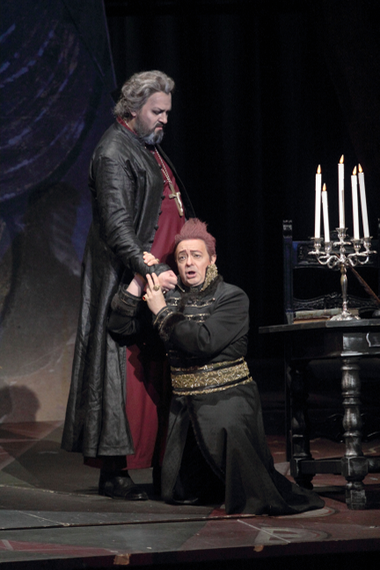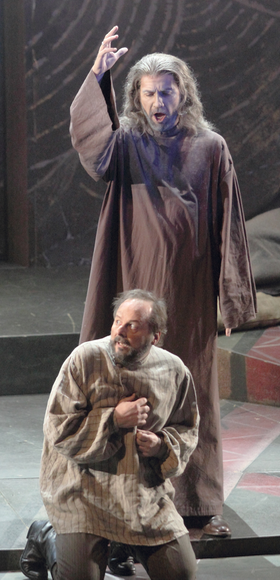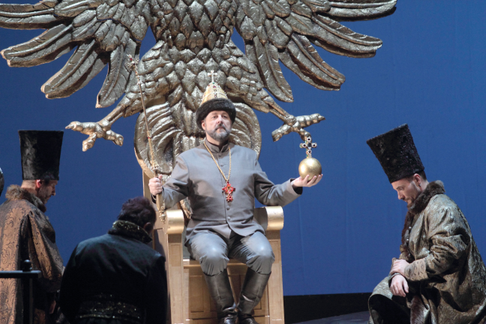Recently in Reviews
English Touring Opera are delighted to announce a season of lyric monodramas to tour nationally from October to December. The season features music for solo singer and piano by Argento, Britten, Tippett and Shostakovich with a bold and inventive approach to making opera during social distancing.
This tenth of ten Live from London concerts was in fact a recorded live performance from California. It was no less enjoyable for that, and it was also uplifting to learn that this wasn’t in fact the ‘last’ LfL event that we will be able to enjoy, courtesy of VOCES8 and their fellow vocal ensembles (more below …).
Ever since Wigmore Hall announced their superb series of autumn concerts, all streamed live and available free of charge, I’d been looking forward to this song recital by Ian Bostridge and Imogen Cooper.
The Sixteen continues its exploration of Henry Purcell’s Welcome Songs for Charles II. As with Robert King’s pioneering Purcell series begun over thirty years ago for Hyperion, Harry Christophers is recording two Welcome Songs per disc.
Although Stile Antico’s programme article for their Live from London recital introduced their selection from the many treasures of the English Renaissance in the context of the theological debates and upheavals of the Tudor and Elizabethan years, their performance was more evocative of private chamber music than of public liturgy.
In February this year, Albanian soprano Ermonela Jaho made a highly lauded debut recital at Wigmore Hall - a concert which both celebrated Opera Rara’s 50th anniversary and honoured the career of the Italian soprano Rosina Storchio (1872-1945), the star of verismo who created the title roles in Leoncavallo’s La bohème and Zazà, Mascagni’s Lodoletta and Puccini’s Madama Butterfly.
Evidently, face masks don’t stifle appreciative “Bravo!”s. And, reducing audience numbers doesn’t lower the volume of such acclamations. For, the audience at Wigmore Hall gave soprano Elizabeth Llewellyn and pianist Simon Lepper a greatly deserved warm reception and hearty response following this lunchtime recital of late-Romantic song.
Collapsology. Or, perhaps we should use the French word ‘Collapsologie’ because this is a transdisciplinary idea pretty much advocated by a series of French theorists - and apparently, mostly French theorists. It in essence focuses on the imminent collapse of modern society and all its layers - a series of escalating crises on a global scale: environmental, economic, geopolitical, governmental; the list is extensive.
For this week’s Live from London vocal recital we moved from the home of VOCES8, St Anne and St Agnes in the City of London, to Kings Place, where The Sixteen - who have been associate artists at the venue for some time - presented a programme of music and words bound together by the theme of ‘reflection’.
'Such is your divine Disposation that both you excellently understand, and royally entertaine the Exercise of Musicke.’
Amongst an avalanche of new Mahler recordings appearing at the moment (Das Lied von der Erde seems to be the most favoured, with three) this 1991 Mahler Second from the 2nd Kassel MahlerFest is one of the more interesting releases.
‘And there was war in heaven: Michael and his angels fought against the dragon; and the dragon fought and his angels, And prevailed not; neither was their place found any more in heaven … that old serpent … Satan, which deceiveth the whole world: he was cast out into the earth, and his angels were cast out with him.’
If there is one myth, it seems believed by some people today, that probably needs shattering it is that post-war recordings or performances of Wagner operas were always of exceptional quality. This 1949 Hamburg Tristan und Isolde is one of those recordings - though quite who is to blame for its many problems takes quite some unearthing.
There was never any doubt that the fifth of the twelve Met Stars Live in Concert broadcasts was going to be a palpably intense and vivid event, as well as a musically stunning and theatrically enervating experience.
‘Love’ was the theme for this Live from London performance by Apollo5. Given the complexity and diversity of that human emotion, and Apollo5’s reputation for versatility and diverse repertoire, ranging from Renaissance choral music to jazz, from contemporary classical works to popular song, it was no surprise that their programme spanned 500 years and several musical styles.
The Academy of St Martin in the Fields have titled their autumn series of eight concerts - which are taking place at 5pm and 7.30pm on two Saturdays each month at their home venue in Trafalgar Square, and being filmed for streaming the following Thursday - ‘re:connect’.
The London Symphony Orchestra opened their Autumn 2020 season with a homage to Oliver Knussen, who died at the age of 66 in July 2018. The programme traced a national musical lineage through the twentieth century, from Britten to Knussen, on to Mark-Anthony Turnage, and entwining the LSO and Rattle too.
With the Live from London digital vocal festival entering the second half of the series, the festival’s host, VOCES8, returned to their home at St Annes and St Agnes in the City of London to present a sequence of ‘Choral Dances’ - vocal music inspired by dance, embracing diverse genres from the Renaissance madrigal to swing jazz.
Just a few unison string wriggles from the opening of Mozart’s overture to Le nozze di Figaro are enough to make any opera-lover perch on the edge of their seat, in excited anticipation of the drama in music to come, so there could be no other curtain-raiser for this Gala Concert at the Royal Opera House, the latest instalment from ‘their House’ to ‘our houses’.
"Before the ending of the day, creator of all things, we pray that, with your accustomed mercy, you may watch over us."
Reviews

25 Feb 2017
Boris Godunov in Marseille
There has been much reconstruction of Marseille’s magnificent Opera Municipal since it opened in 1787. Most recently a huge fire in 1919 provoked a major, five-year renovation of the hall and stage that reopened in 1924.
Only the frieze above the stage is said to remain of the original theater.
While the current theater does not have a pit of sufficient size to host full-scale Romantic orchestras (to compensate harps and percussion instruments are placed in the baignoires (boxes stage level) over the pit often resulting in bizarre acoustics. At the same time this opera house boasts an amazing stage/spectator rapport that may be unequalled anywhere in the world — words flowing from the stage are clearly audible with no loss of the clarity and volume of orchestral sound. This theater like no other offers the possibility of achieving the epitome of the operatic ideal.
There were fortunately a few splendid moments to be savored in the recent production of Mussorgsky’s 1969 (first version) Boris Godunov, notably the sly Boyar Shuisky fueling Boris’ fears with his description of the dead Dimitri, the old monk Pimen’s recounting of the miracle at Dimitri’s tomb (a blind man praying recovered his sight), and finally Boris admonitions to his son Feodor to rule justly, delivered in his dying breaths.
These moments occurred in the few, very few periods when the frenetic movement on the stage relaxed somewhat, when storytelling phobia quieted a bit, when the singers could remain still long enough to expound the Pushkin story in the glories of the play of Russian phonemes.
Italian conductor Paolo Arrivabeni well supported these successful soliloquies in a somewhat restrained reading of the score. Perhaps he was attempting to mitigate the scenic hyperventilation.
Marseille fielded a respectable cast to tell Mussorgsky’s story, most notably the Boris of Russian bass Alexey Tikhomirov who had replaced Ruggiero Raimondi in this same production from Liège in 2010. Mr. Tikhomirov is of imposing stature and imposing voice. He finds much subtlety in the Boris personage, and as well assumes much of the stature needed to illuminate such a conflicted ruler. Tenor Luca Lombardo brought a blatantly evil spirit into his character portrayal of Shuisky. Of the principles 44 year-old French bass Nicolas Courjal made the most effect as the old monk Pimen, illuminating the Boris/Dimitri mysteries in a beautiful and clear tonal language that filled the theater.
 Nicolas Courjal as Pimen, Jean-Pierre Furlan as Gregory
Nicolas Courjal as Pimen, Jean-Pierre Furlan as Gregory
Mezzo Marie-Ange Todorovitch did double duty as the innkeeper and the Boris children’s nurse, both roles delivered with pleasurable linguistic gusto. Soprano Ludivine Bombert made beautiful sounds in her laments as Boris’ daughter Xenia. Bass Wenwei Zhang enacted a splendid Varlaam, the drunken friar.
More problematic were the roles of Boris’ son Feodor, nicely sung by diminutive mezzo Caroline Meng. For the role to achieve its full and intended effect it must be sung by a young boy. Tenor Jean-Pierre Furlan embodied a ribald, ambitious, rough-voiced Grigory — a nervous wreck. This Grigory was definitely not a subtle schemer who you might believe could rally revolutionary forces. The Innocent, sung by tenor Christophe Berry, was in strident tone and grotesquely staged body movements.
 Dimitri, Czar of Russia 1605-1606, the final image of the Ionesco production of the 1869 Boris Godunov
Dimitri, Czar of Russia 1605-1606, the final image of the Ionesco production of the 1869 Boris Godunov
Stage director and designer Petrika Ionesco deconstructed a Russian Orthodox fresco into George Braque-like, i.e. cubistic shapes, adding solid blocks of colored lights in open places. Scene changes were long, noisy and off-putting in this two and one-half hour sitting (no intermission). Evidently Mr. Ionesco was taken by the intense poses he found in Russian frescos, poses that he induced his actors and the chorus to imitate. This came across as blatantly naive, caricatured acting in incessant movement. It was laughable until it became unwatchable.
Michael Milenski
Cast and production information:
Boris Godounov: Alexey Tikhomirov; Pimène: Nicolas Courjal; Gregori / Dimitri: Jean-Pierre Furlan; Chouisky: Luca Lombardo; Xénia: Ludivine Gombert; Fiodor: Caroline Meng; La Nourrice / L’Hôtesse: Marie-Ange Todorovitch; Varlaam: Wenwei Zhang; L’Innocent: Christophe Berry; Andrei Tchelkalov: Ventseslav Anastasov; Missail: Marc Larcher; Nikitch / Officier de Police: Julien Veronese; Mityukha: Jean-Marie Defpas. Orchestre et Chœur de l’Opéra de Marseille; Maîtrise des Bouches-du-Rhône. Conductor: Paolo Arrivabeni; Mise en scène / Décors Petrika Ionesco; Lumières: Patrick Méeus. Opéréa Municipal, Marseille, February 21, 2017.


